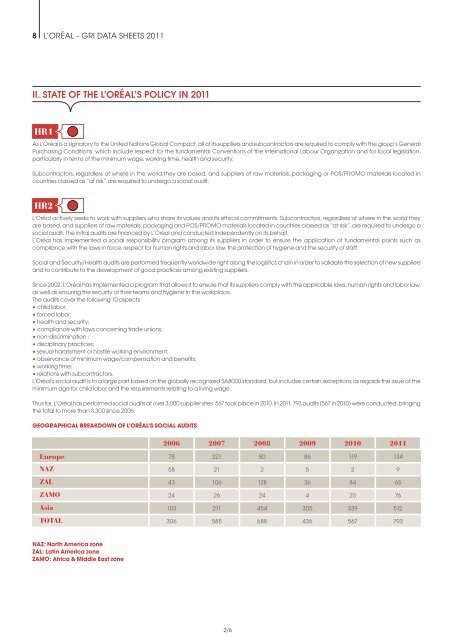Organizational Strategy - Sustainable Development - L'Oréal
Organizational Strategy - Sustainable Development - L'Oréal
Organizational Strategy - Sustainable Development - L'Oréal
You also want an ePaper? Increase the reach of your titles
YUMPU automatically turns print PDFs into web optimized ePapers that Google loves.
8 L’OréaL - GrI DaTa SHEETS 2011<br />
II. STATE OF THE L’ORÉAL’S POLICY IN 2011<br />
HR1<br />
as L’Oréal is a signatory to the United Nations Global Compact, all of its suppliers and subcontractors are required to comply with the group’s General<br />
Purchasing Conditions, which include respect for the fundamental Conventions of the International Labour Organization and for local legislation,<br />
particularly in terms of the minimum wage, working time, health and security.<br />
Subcontractors, regardless of where in the world they are based, and suppliers of raw materials, packaging or POS/PrOMO materials located in<br />
countries classed as “at risk” are required to undergo a social audit.<br />
HR2<br />
L’Oréal actively seeks to work with suppliers who share its values and its ethical commitments. Subcontractors, regardless of where in the world they<br />
are based, and suppliers of raw materials, packaging and POS/PrOMO materials located in countries classed as “at risk”, are required to undergo a<br />
social audit. The initial audits are financed by L’Oréal and conducted independently on its behalf.<br />
L’Oréal has implemented a social responsibility program among its suppliers in order to ensure the application of fundamental points such as<br />
compliance with the laws in force, respect for human rights and labor law, the protection of hygiene and the security of staff.<br />
Social and Security/Health audits are performed frequently worldwide right along the logistics chain in order to validate the selection of new suppliers<br />
and to contribute to the development of good practices among existing suppliers.<br />
Since 2002, L’Oréal has implemented a program that allows it to ensure that its suppliers comply with the applicable laws, human rights and labor law,<br />
as well as ensuring the security of their teams and hygiene in the workplace.<br />
The audits cover the following 10 aspects:<br />
• child labor;<br />
• forced labor;<br />
• health and security;<br />
• compliance with laws concerning trade unions;<br />
• non-discrimination ;<br />
• disciplinary practices;<br />
• sexual harassment or hostile working environment;<br />
• observance of minimum wage/compensation and benefits;<br />
• working time;<br />
• relations with subcontractors.<br />
L’Oréal’s social audit is to a large part based on the globally recognized Sa8000 standard, but includes certain exceptions as regards the issue of the<br />
minimum age for child labor and the requirements relating to a living wage.<br />
Thus far, L’Oréal has performed social audits at over 3,000 supplier sites: 567 took place in 2010. In 2011, 793 audits (567 in 2010) were conducted, bringing<br />
the total to more than 3,300 since 2006.<br />
GEOGRAPHICAL BREAKDOWN OF L’ORÉAL’S SOCIAL AUDITS<br />
NAZ: North America zone<br />
ZAL: Latin America zone<br />
ZAMO: Africa & Middle East zone<br />
2006 2007 2008 2009 2010 2011<br />
Europe 78 221 80 86 119 134<br />
NAZ 58 21 2 5 2 9<br />
ZAL 43 106 128 36 84 65<br />
ZAMO 24 26 24 4 23 76<br />
Asia 103 211 454 305 339 512<br />
TOTAL 306 585 688 436 567 793<br />
2/6






